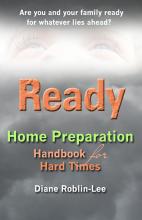
Urgent Update:
Things are moving very quickly and it’s important for people to understand the critical nature of our times. To get beyond the propaganda of regular news, we encourage you to get the most up-to-date information from sources other than mainstream media.
Ready… Home Preparation for Tough Times
The following is the introduction to the e-book which is available on Amazon.ca & Amazon.com
It will contain practical checklists for home and family preparation.
The world is changing. Life as we have known it is on the brink of being turned upside down – but this isn’t the first time the world has waited, with bated breath, to see what was going to happen next.
With the magnitude and variety of monsters at our doors – wars springing up all over the globe, imminent financial collapse, breakdown of traditional values, news of impending famines, China and Russia poised to usurp the World Bank, breakouts of deadly viruses, the moon turning blood red on significant days, Israel surrounded by global enemies, earthquakes happening in unprecedented numbers and bankers jumping out of windows – it would seem that all our past upheavals and warnings have served only as pre-game warm-ups for what is to come.
History has served as the lesson book, demonstrating the factors that have led to both brilliance and destruction. How well the lessons have been learned will be evidenced by the outcome of the days ahead.
Many are in denial, preferring to believe this is just another difficult time in history. There have always been wars, they say. News of cruel people doing cruel things is nothing new. The idea of life as we know it coming to an end in some kind of confirmation of the Biblical warnings is unthinkable.
Whether they’re right or wrong, huge, looming changes are casting long shadows over our abilities to continue life as we know it. So what do we do?
Throughout history, we have been given examples of what to do and what not to do in times of impending calamity. Remember Noah and his warnings that faded from earshot in the winds and raging seas? How about Joseph and his example of storing up food for seven years of famine? What did those two examples tell us? We need to listen to well-founded voices of warning and plan ahead.
Could it be that the no-show of the Y2K threat was one such pre-game warm-up, the difference being that it happened in our time and gave us a practical opportunity to learn what to do if life (as we know it) changed? As the year 2000 approached, the world held its breath in a nail-biter ‘wait-and-see’ with the threat of computer shut-downs. The concern was that computers had not been programmed to deal with the rollover from the 1900’s to the 2000’s. With society having become utterly dependent on the grid being in good working order, the consequences of being without electricity were staggering. Our entire way of life was threatened. Would manufacturers, energy producers and food growers be able to get their goods to consumers? Would the doors of banks lock out account holders? Would we be able to get news of what was happening world-wide? Would seniors living in high-rises be able to keep warm? What would happen if parents could not feed their children?
As in the days of Noah, many people languished in the apathetic comfort of waiting and seeing what would happen, most too overwhelmed with the possibilities to even ‘go there’ in their thoughts. Few chose to go out on a limb and declare there would be no problem, because no one knew for sure what would happen – and just in case those issuing warnings were right, they didn’t want to be proven wrong. Those who dared to brave the limb and warn people in case the grid went down were given nodding assent until Y2K proved to be a no-show. At that point, everyone was happy to chop off the branch and be rid of the warners, smugly declaring they had known nothing would happen.
In October of 1998, as the impending millennium approached, I did a ton of research into how to prepare for the possible eventuality of a total shut down. As my mind began to grasp the realization that we as a civilization could be facing one of the most monumental challenges in history, the question, “How can we best prepare?” echoed endlessly.
It was obvious that, while third world countries might not experience noticeable changes in their lives, western civilization was extremely vulnerable, having handed over our reins to the gods of computer technology.
As we must do today, I thought far into the future about a multitude of concerns: how to cope in the absence of doctors, how to exchange or acquire goods and services in the absence of money, what to stock in order to survive a cold winter, how to establish a workable community with the total breakdown of government… ad infinitum. I got a wood stove and learned how to preserve foods. I exchanged my electric stove for a basic gas one that did not require electric ignition. I had laser surgery done so that I’d be able to see if I were unable to replace my glasses or contacts. I stocked enough dried rice and beans to have extra for hungry souls who happened by. I organized a plan for living in community, with everyone contributing his or her abilities or services to the needs and protection of the group. I traveled the Chapters circuit, distributing my book, Y2K and You – a Home Preparation Guide, to raise awareness of what to do in case of a shut down.
While I had good support at home (because my friends and family were aware of the depth of my research), public support was not unanimous. Many waited for a successful click over into the year 2000 when they’d be able to exhale and say, “I told you so.”
On New Year’s Eve, 1999, we were at the home of friends for traditional end-of-the-year festivities. At the stroke of midnight, the lights went out and the house was in blackness. Silence. And then we heard laughter. Someone had pulled the switch on the breaker box in fun – and the lights broke the darkness. Silence led to pre-pubescent giggling as the fears of the previous years dissolved and the need for preparations evaporated. Whew!
Truthfully, despite my massive efforts, I was happier than anyone that I’d been wrong because I had become educated in the realities of what would have happened if the lights had gone out. Despite the scorn from those who reveled in the fact that I’d been wrong, if the same thing were to happen today, I would respond in the same way – because no one knew what was going to happen and I’d rather be prepared than not. There’s a certain security in having one’s ducks lined up as neatly as possible.
Twenty-three years later, the heart of the world quakes again as we await the outcome of tensions far beyond our control.
And I? I stare at my computer monitor and wonder what my life can possibly contribute to alleviate the fears of people all around me. The adolescent fears of the grid going down pale in the face of what now confronts us. Do I raise my banner again, using the Y2K lessons as preparation for the challenges of today? Or do I retire, licking the wounds of my frayed influence?
Is it time to revisit Noah and Joseph? They were all about being as prepared as possible for potential problems, knowing it’s easier to prepare when there is still time to deal with possibilities, than to groan in need when the opportunities to position oneself and one’s family and community as securely as possible are no longer available. Would it be better to face the mockery of nay-sayers than be faced with the regret of not taking providential steps for our families and communities while it is still possible?
While there are those who would say our security is supposed to be in God, I would point them, once again, to Noah and Joseph whose faith in God was not only absolute, but sensible. It was, after all, God who had led them to prepare for the days of struggle.
The reality is that it’s not about me; it’s about sharing the information I gathered in hopes that it may be of benefit to one person or to many. It’s not about running around like Chicken Little, screaming that the sky is falling, but neither is it about fiddling while Rome burns. It is simply about making information available to people to help them get through the dark days ahead.

